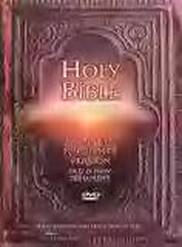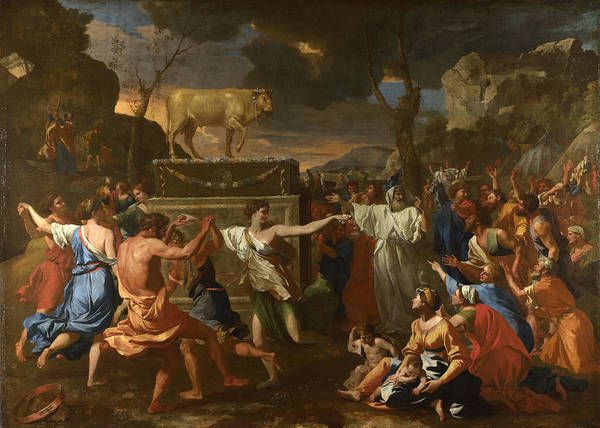Acts 7:35-50
Lesson 233
Read both the "King James Bible" and the "New Living Translation."
In this lesson:
The history lesson continues.
Stephen lectures the Sanhedrin on Israel's idolatry and shows the connection between Moses and Jesus.
The Adoration of the Golden Calf.
By French Baroque artist Nicolas Poussin (1594-1665).
By French Baroque artist Nicolas Poussin (1594-1665).
Who were -
Moloch -
A pagan god, also called Molech (Leviticus 18:21), Milcom (1 Kings 11:5), or Malcham (Zephaniah 1:5). One of the more abhorrent pagan religions, the Ammonites, Edomites and Moabites, considered Moloch a father figure and sacrificed children to him by throwing them alive into a fire. Worshipping Moloch was forbidden by Hebrew law (Leviticus 18:21), and it so angered God that He promised to "put to death" anyone who sacrificed their children to Moloch (Leviticus 20:1-5).
Remphan -
An Egyptian star god that the Israelites worshipped after escaping slavery in Egypt.
Jesus-
He was usually called Joshua. Joshua was the son of Nun (Exodus 33:11; Numbers 14:6; 14:38; 27:18) from the tribe of Ephraim and sometimes called Oshea or Jehoshua (Numbers 13:16). Joshua was born a slave in Egypt but became a great Hebrew general (Exodus 17:9-16) and close adviser to Moses. He had the honor of being the only person allowed to follow Moses partway up Mount Sinai as he went to receive the Mosaic Law (Ten Commandments) from God (Exodus 24:12-13). Moses sent Joshua to explore the Promised Land, and he returned with an encouraging report (Numbers 14:6-8). Later, God hand-picked him to succeed Moses as Israel's leader (Numbers 27:15-23; Deuteronomy 31:14). After Moses passed away, Joshua led the Israelites into the promised land (Deuteronomy 1:38; 31:23) and governed Israel for twenty-five years. He lived to be 110 and was buried in Timnath-serah in Ephraim. After Joshua died, Israel drifted away from God and began to follow the idolatry of their neighbors. You can find Joshua's story in "The Book Of Joshua."
Solomon -
The son of King David and Bath-Sheba (2 Samuel 12:24), and the third king of Israel. Famous for his great wisdom (1 Kings 3:12; 4:34; 5:7; 10:4-8), Solomon (meaning "peaceable") ruled Israel for forty years (I kings 11:42), from 965 to 925 BC. He was the most powerful and famous king of his day. His intellect was renowned. Scholars, kings, and queens traveled long distances to meet him (1 Kings 10:1-2). He built the Temple in Jerusalem (1 Kings 6:1; 9:1; 1 Chronicles 28:6), forged military and commercial pacts (1 Kings 5:12), wrote the Old Testament books of "Ecclesiastes," "Song of Solomon," most of Proverbs and part of Psalms. He penned 1,005 songs and was interested in everything from botany to science, politics, commerce, poetry, and animal husbandry (1 Kings 4:32-33). However, he lost the loyalty of the Jewish people when he overtaxed them. He praised God (2 Chronicles 6:12-14) but eventually turned his back on Him (1 Kings 11:4-6; 11:9). Solomon had seven hundred wives and three hundred concubines (1 Kings 11:3). Some of these women were pagan idolaters. To satisfy them, Solomon built pagan altars and introduced heathenism into the Kingdom. Fortunately, Solomon eventually repented. After Solomon died, his Kingdom was split in two. The northern half was called Israel, the southern half, Judah. You can read more about Solomon in 2 Samuel 12:24-1 Kings 11:43 and 2 Chronicles 1:1-10:19.
Moloch -
A pagan god, also called Molech (Leviticus 18:21), Milcom (1 Kings 11:5), or Malcham (Zephaniah 1:5). One of the more abhorrent pagan religions, the Ammonites, Edomites and Moabites, considered Moloch a father figure and sacrificed children to him by throwing them alive into a fire. Worshipping Moloch was forbidden by Hebrew law (Leviticus 18:21), and it so angered God that He promised to "put to death" anyone who sacrificed their children to Moloch (Leviticus 20:1-5).
Remphan -
An Egyptian star god that the Israelites worshipped after escaping slavery in Egypt.
Jesus-
He was usually called Joshua. Joshua was the son of Nun (Exodus 33:11; Numbers 14:6; 14:38; 27:18) from the tribe of Ephraim and sometimes called Oshea or Jehoshua (Numbers 13:16). Joshua was born a slave in Egypt but became a great Hebrew general (Exodus 17:9-16) and close adviser to Moses. He had the honor of being the only person allowed to follow Moses partway up Mount Sinai as he went to receive the Mosaic Law (Ten Commandments) from God (Exodus 24:12-13). Moses sent Joshua to explore the Promised Land, and he returned with an encouraging report (Numbers 14:6-8). Later, God hand-picked him to succeed Moses as Israel's leader (Numbers 27:15-23; Deuteronomy 31:14). After Moses passed away, Joshua led the Israelites into the promised land (Deuteronomy 1:38; 31:23) and governed Israel for twenty-five years. He lived to be 110 and was buried in Timnath-serah in Ephraim. After Joshua died, Israel drifted away from God and began to follow the idolatry of their neighbors. You can find Joshua's story in "The Book Of Joshua."
Solomon -
The son of King David and Bath-Sheba (2 Samuel 12:24), and the third king of Israel. Famous for his great wisdom (1 Kings 3:12; 4:34; 5:7; 10:4-8), Solomon (meaning "peaceable") ruled Israel for forty years (I kings 11:42), from 965 to 925 BC. He was the most powerful and famous king of his day. His intellect was renowned. Scholars, kings, and queens traveled long distances to meet him (1 Kings 10:1-2). He built the Temple in Jerusalem (1 Kings 6:1; 9:1; 1 Chronicles 28:6), forged military and commercial pacts (1 Kings 5:12), wrote the Old Testament books of "Ecclesiastes," "Song of Solomon," most of Proverbs and part of Psalms. He penned 1,005 songs and was interested in everything from botany to science, politics, commerce, poetry, and animal husbandry (1 Kings 4:32-33). However, he lost the loyalty of the Jewish people when he overtaxed them. He praised God (2 Chronicles 6:12-14) but eventually turned his back on Him (1 Kings 11:4-6; 11:9). Solomon had seven hundred wives and three hundred concubines (1 Kings 11:3). Some of these women were pagan idolaters. To satisfy them, Solomon built pagan altars and introduced heathenism into the Kingdom. Fortunately, Solomon eventually repented. After Solomon died, his Kingdom was split in two. The northern half was called Israel, the southern half, Judah. You can read more about Solomon in 2 Samuel 12:24-1 Kings 11:43 and 2 Chronicles 1:1-10:19.
Study Tip:
It takes the whole Bible to make a whole Christian, read the Old Testament, too.
It takes the whole Bible to make a whole Christian, read the Old Testament, too.




